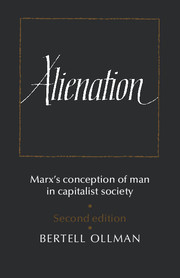Book contents
- Frontmatter
- Contents
- Preface to the second edition
- Note on translations
- Acknowledgements
- General introduction
- PART I PHILOSOPHICAL INTRODUCTION
- PART II MARX'S CONCEPTION OF HUMAN NATURE
- 7 Powers and needs
- 8 Natural man
- 9 Species man
- 10 Relating man to objects: orientation, perception
- 11 Appropriation
- 12 Nature as evidence
- 13 Activity, work, creativity
- 14 Man's social nature
- 15 The character of the species
- 16 Freedom as essence
- 17 Man, classes, people
- PART III THE THEORY OF ALIENATION
- PART IV CONCLUSION
- Appendix I In defense of the philosophy of internal relations
- Appendix II Response to my critics: more on internal relations
- Notes to the text
- Bibliography of works cited
- Index of names and ideas
- Cambridge Studies in the History and Theory of Politics
12 - Nature as evidence
Published online by Cambridge University Press: 05 June 2012
- Frontmatter
- Contents
- Preface to the second edition
- Note on translations
- Acknowledgements
- General introduction
- PART I PHILOSOPHICAL INTRODUCTION
- PART II MARX'S CONCEPTION OF HUMAN NATURE
- 7 Powers and needs
- 8 Natural man
- 9 Species man
- 10 Relating man to objects: orientation, perception
- 11 Appropriation
- 12 Nature as evidence
- 13 Activity, work, creativity
- 14 Man's social nature
- 15 The character of the species
- 16 Freedom as essence
- 17 Man, classes, people
- PART III THE THEORY OF ALIENATION
- PART IV CONCLUSION
- Appendix I In defense of the philosophy of internal relations
- Appendix II Response to my critics: more on internal relations
- Notes to the text
- Bibliography of works cited
- Index of names and ideas
- Cambridge Studies in the History and Theory of Politics
Summary
It is not only the powers involved in appropriation but also the objects appropriated that are said to become human in communism. Until now, our chief concern has been with man, the subject, and his powers. Equal attention must be given to Man's objects as the necessary manifestations of these powers. According to Marx, ‘Communism is the complete emancipation of all human senses and attributes; but it is this emancipation precisely because these senses and attributes have become, subjectively and objectively, human.’ They have become ‘subjectively’ human in that man's powers and needs have attained their full potential, and ‘objectively’ so in the sense that his objects are indicative of this achievement. Such objects constitute the ‘human essence’ that Marx says will be appropriated in communism. In his words, ‘The eye has become a human eye just as its object has become a social, human object – an object emanating from man for man.’
Because his powers are so extensive, communist man requires the whole of nature brought up to the level of his appropriation to satisfy him. Thus, in this period, the entire world is spoken of as ‘the world of Man's essential powers – human reality … all objects become for him the objectification of himself, become objects which confirm and realize his individuality’.
- Type
- Chapter
- Information
- AlienationMarx's Conception of Man in a Capitalist Society, pp. 94 - 96Publisher: Cambridge University PressPrint publication year: 1977



